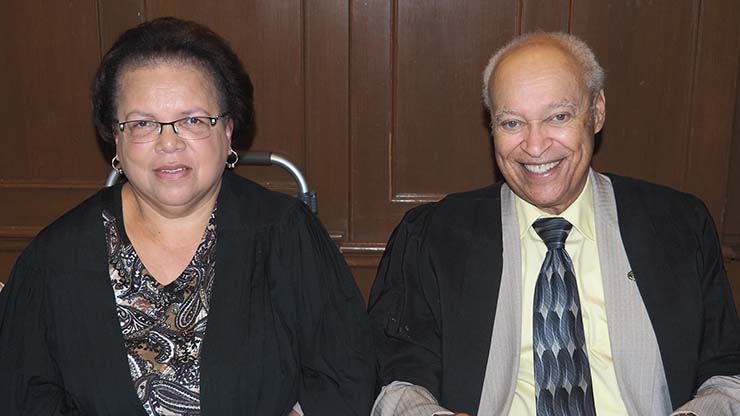There was never much doubt in the Earle household, in 1950s Halifax, about whether the boys would be going to university.
“My father worked as a porter for CN Rail,” says Gordon Earle, BA’63. “He would often say to me and my brothers, ‘Sons, I don’t want you to have to do the kind of work I do.’ Now, he was proud of his work and he always worked hard but he was determined that we would be able to find employment elsewhere.”
So Gordon worked hard at Queen Elizabeth High School, got good marks and began thinking about where to go to fulfil his father’s dreams. The choice was easy when he was awarded a brand new scholarship worth a thousand dollars a year for four years from King’s. Big bucks in 1959.
“I was the first person to be awarded the Prince Scholarship. As I recall, I think the powers that be sought me out. They must have checked the records and found that I was a fairly accomplished student. So they came after me.”
But a month before he went into his first class at King’s Gordon’s father had a heart attack.
“My father was the sole bread winner in the family and after he died money was tight. We couldn’t have paid the tuition fees.”
The scholarship covered that and more. It changed Gordon’s life.
The Prince Scholarship was named after Dr. Samuel Prince (1886-1960), a pioneering sociologist and professor at King’s. It was the first scholarship specifically for African Nova Scotians.
Sixty-one years after Gordon walked across the quad for that first class Sophia Wedderburn joined King’s as the 2020 Prince Scholar. Unlike Gordon she had to apply for it.

2020 Prince Scholarship receipient Sophia Wedderburn.
“I was scrolling through the awards and the Prince Scholarship really spoke to me.” Sophia says. “I did a bit of background research on Dr. Samuel Prince and I saw that the award was founded on the integrity of his legacy. I was just drawn to it. He was a sociologist and contributed so much to King’s and Dal. But also to the community. He helped with the relief efforts after the Halifax Explosion. It was so poignant. I wanted to apply.”
Sophia found out she was successful when President Bill Lahey gave her a call. She was overjoyed and couldn’t imagine ever being more excited. Turns out she could be.
“A few months later I received a letter from a man named David Jones, [BA(Hons)’64]. He congratulated me on getting the Prince Scholarship. He had received the scholarship in 1960! He told me that when he got it my grandfather, Gus Wedderburn, actually wrote him a letter of congratulations!”
Gus was a passionate advocate for social justice for African Nova Scotians, a lawyer and a teacher who believed fervently in the power of education. David was touched by Gus’s note and in his letter to Sophia David says he was paying it forward. Sophia reads from it:
“Perhaps you could consider this letter as a completion of the circle begun by your grandfather.”
Sophia says it gave her shivers.
“I can’t make this up! It’s insane!” she says with a huge smile.
Sophia is lucky to have come upon the scholarship when she did. Funding for it had lapsed in the late 1960s and the award was discontinued. But in 2018 generous gifts from individual donors allowed the university to once again offer the Prince Scholarship—now worth six thousand dollars a year for four years.
Gordon Earle says it has come back at the right time.

Prince scholarship recipients Mureena Herbert and Gordon Earle at the announcement of the re-establishment of the scholarship in 2018.
“When they decided to bring the scholarship back I was invited along with another recipient, Mureena Hebert, [BA’72], to the announcement from President Lahey. It was a good thing to do, now more than ever, with movements such as Black Lives Matter, tensions between the police and Black communities—it’s more important than ever to give emphasis to diversity and provide a positive message around that.”
Gordon says he was the only Black Nova Scotian student when he was at King’s. But he has only warm memories of acceptance by his fellow students. There are more Black students today, but Sophia says not enough.
“I am the only student of African descent in my tutorial group at King’s. We recently read Thoughts and Sentiments on the Evils of Slavery by Quobna Cugoano. When we talked about it I felt I needed to say poignant things, to carry the conversation. It’s a feeling in my gut that I get. In those moments you can feel alone. So having space like the Black Student Advising Centre is really important. I can be with people who share my roots.”
Sophia, her whole life ahead of her, would like to follow in her grandfather’s footsteps and go into law. The Prince Scholarship has given her the opportunity to do just that. For Gordon, the scholarship paved the way to a career of public service. He studied sociology, he was the first employee of the Nova Scotia Human Rights Commission and helped draft the first NS Human Rights Act. He was the first Black Nova Scotian elected to Parliament. He says he could never have done what he did had it not been for that scholarship. But there is much more to be done.
“All schools, including the universities, need to do a better job. We have African Heritage Month and during that month there is a flurry of things that focus on Black people. But that should be throughout the year as a normal part of what is taught and discussed.”
The Prince Scholarship torch is now in Sophia’s hand.
Earlier in this academic year, the university added the Sylvia D. Hamilton Awards to its opportunities for recognition for African Canadian students. For more information about the Prince Scholarship and other awards for African Canadian students visit our undergraduate scholarships page.
Story update: In September 2023, the Prince Scholarship was renamed the Gordon Earle Scholarship.

